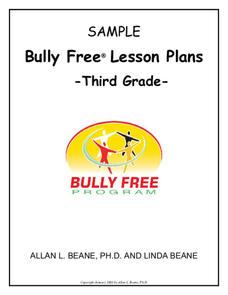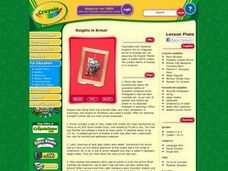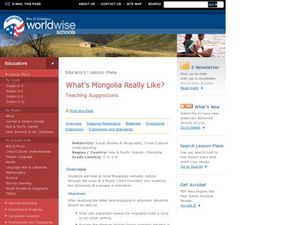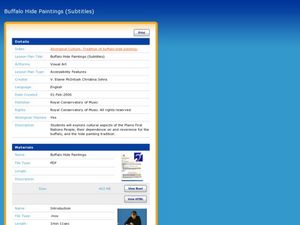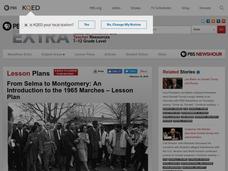Museum of Tolerance
The Pursuit of Democracy and Diversity: The Trial of Pro-Social Injustice in Historical Documents and Accounts
Class members investigate The Indian Removal Act of 1830, U.S. Theft of Mexican Territory Timeline, and President Abraham Lincoln’s letter to Horace Greeley, 1862, and then conduct a mock trial of each of these documents to determine...
National Endowment for the Humanities
Lesson 4 James Madison: Internal Improvements Balancing Act—Federal/State and Executive/Legislative
Who has the power? The founding fathers asked the same question when the United States was formed. Learners explore issues that arose during Madison’s presidency that raised constitutional questions. Through discovery, discussion, and...
Curated OER
Lesson: Text Messages
Can a neon sign be considered art? Kids consider two different works that use neon text as the basis for conveying artistic social messages. They then analyze a truism from Jenny Holzer's web site that holds meaning to them personally....
Curated OER
Lesson: Ginger Brooks Takahashi: Powerstich: A Forum for Community-Building
This is a great way to build community in your school, experience process-based art, and explore the critical-thinking process. While quilting as a class collectively (just like a quilting bee) pupils listen to poetry and prose of a...
iCivics
Mini-Lesson: Presidential Pardons
How do United States presidents give people second chances? Scholars research the concept of presidential forgiveness, or pardon. By completing an Executive Branch Mini-Lesson, class members get a better grasp of the power the executive...
iCivics
Mini-Lesson: Veto Power
No means no! Scholars analyze the impact of one of the president's most powerful tools—the veto—while also finding out ways to properly check facts for validity. They research the power of the presidential veto with paired activities and...
Bully Free Systems
Bully Free Lesson Plans—Third Grade
Two lessons shed light on two types of bullying: verbal and cyberbullying. After defining the two types, scholars take part in whole-group discussions, complete worksheets, and write reflections. A parent or guardian chat encourages an...
Bully Free Systems
Bully Free Lesson Plans—Fifth Grade
Two lessons take a look at bullying. Lesson one focuses on physical bullying. Scholars identify the bullying type's qualities, read short stories and answer comprehension questions. Lesson two offers advise on what to do as a bystander...
Curated OER
Lesson: Unmonumental: Final Projects
If you've used any of the New Class Museum lessons exploring the theme, Unmonumental, then check this out! Included are three different final project ideas that tie into the other seven Unmonumental lessons. Kids create community through...
The New York Times
Crossing the Line Online: Sexual Harassment and Violence in the Age of Social Media - NYTimes.com
Sexual harassment and sexual violence are by no means new issues. What has changed is the role of social media in these issues. This powerful and troubling lesson uses a specific rape case to launch research into a discussion of the...
Historical Thinking Matters
Social Security: 5 Day Lesson
Did the New Deal fundamentally shift the role of the American government in the economy? Your class members will examine the interpretations of various historians in answering this question, and use a variety of primary and secondary...
Curated OER
Flying High in Arkansas: A Study of the State Flag
An outstanding activity on the Arkansas State Flag is here for you. In it, elementary schoolers learn about the symbolism of the flag, and create a replica of the flag as a final activity. They also memorize the Arkansas State Pledge,...
Facing History and Ourselves
Transcending Single Stories
The focus of the second lesson plan in the Standing Up for Democracy unit is on the power of assumptions based on a single experience or point of view. Class members begin by journaling about assumptions others make about their identity...
Curated OER
Lesson 1: English-Indian Encounters
What did the English settlers think of the Native Americans inhabiting the Chesapeake region of the United States? Learners analyze a series of documents and images to determine the English perception of the local inhabitants. A great...
Curated OER
Social Studies: Lesson 2
Students explore the beginning of Communism. For this World History lesson, students exhibit their knowledge of Communism and the Marshall Plan through completion of a map activity.
Curated OER
Knights in Armor
Arm your social studies class with knowledge about the middle ages. After learners use the internet to view photographs of the Middle Ages, they research the various types of armor used by those who were fighting and how it was worn. To...
Macmillan Education
Study Skills
Good study habits are key to success in school. The activities in this packet are designed to get kids thinking about improvements they could make in their study habits.
Curated OER
What's Mongolia Really Like?
Students discover the people of Mongolia. In this social studies lesson plan, students look at the Mongolian nomadic culture by reading a letter written by a member of the Peace Corps. They describe the different types of communities...
Teaching Tolerance
Using Photographs to Teach Social Justice | Confronting Unjust Practices
A powerful photograph of the Freedom Riders of 1961 launches an examination of the de jure and de facto injustices that the civil rights movement of the 1950s and 1960s addressed. Young historians first watch a video and read the Supreme...
Curated OER
Buffalo Hide Paintings
To the Native American people living on the plains, the buffalo represented culture, art, sustenance, and survival. Explore the history of the buffalo with a social studies instructional activity, in which learners create a buffalo hide...
PBS
From Selma to Montgomery: An Introduction to the 1965 Marches
The 1965 Civil Rights marches from Selma to Montgomery and the resulting Voting Rights Act of 1965 are the focus of a social studies lesson. The resource uses film clips to inform viewers not only about the discrimination that gave rise...
Stanford University
Lesson Plan: Montgomery Bus Boycott
Most of us have heard of Rosa Parks, the Montgomery Bus Boycott, and Martin Luther King, Jr. But what about Claudette Colvin, Virginia Durr, Freedom Summer, or the Birmingham Children's Crusade? A five-lesson unit prompts class members...
Teaching Tolerance
Using Photographs to Teach Social Justice | Exposing Racism
Photographs capture a moment in time. And some of the best pictures demand that viewers not only ask questions about why the photo packs such an emotional wallop, but also about what happened before and after it was taken. A photograph...
NPR
Women Of Jamestown Lesson Plan
To better understand the role women played in early 17th century US history, class members examine the National Women's History Museum's online exhibit, Building the New World: the Women of Jamestown Settlement. After studying the 11...
Other popular searches
- Esl Social Studies Lessons
- Social Studies Lessons Rome
- Social Studies Lessons Japan
- Social Studies Lessons on Maps








